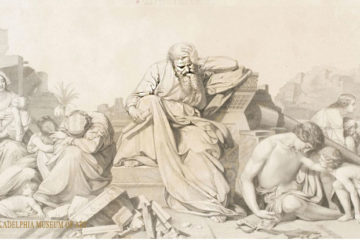
Adam and Eve Died
- Comment on the graphic. This complex three-panel illustration covers aspects of Adam and Eve’s lives that affect every person from Adam and Eve through today. It represents aspects of their lives and their death, the latter arising from their disobedience to the commands of God. The LORD created them to live forever. They were created and lived for some time free from sin; however, they, of their own free will, choose to rebel against the Word of God: Adam and Eve sinned; Adam and Eve died.
Be sure to write what you observe in the graphic BEFORE proceeding with this study. We encourage you to print this study and share it with others.
Panel 1 Analysis (Left)
Panel 2 Analysis (Middle)
Panel 3 Analysis (Right)
Be sure to fill in all blanks in this study, answer all questions, and read all suggested Scriptures. Use a King James Bible. If you don’t have one, see our Materials section to order one or click on the following link for an online King James Bible: https://www.kingjamesbibleonline.org/index.php
- Do you think that Adam and Eve were saved at any point in their lives after they sinned? What information influenced your opinion?
- The terms of Adam and Eve’s salvation, if we can call them that, were laid out in Genesis 2:16-17. Review this portion of Scripture:
“And the LORD God commanded the _________, saying, Of every tree of the garden thou mayest freely eat: But of the tree of the knowledge of good and evil, thou shalt _______ eat of it: for in the day that thou eatest thereof thou ____________________________.” Genesis 2:16-17
- To whom was the command given?
b. What was the command?
c. To whom did the command apply?
d. What did God say would happen if the man ate from the tree of the knowledge of good and evil?
Were God’s directions made clear to Adam?
Even though a study of the underlying Biblical languages is not necessary for the understanding of Scripture, there are times when looking at some of the nuances of the Hebrew (Old Testament underlying language) and Greek (New Testament underlying language) can give us additional insight. Such a review, however, should not have as its purpose to alter the meaning of the English text for us and should not replace or become a substitute for interpretation of the Scriptures from the context.
The Hebrew words give not a different meaning to the warning about the death sentence to Adam but a deepening of its meaning. That meaning may be discernible from the context to some students of the Word but for most of us, additional information deepens our appreciation for what is recorded.
 Study the Hebrew words at the left for what text says in English: “thou shalt surely die.” Do you see the English words “thou shalt surely die” have one underlying root word, but it is written twice mowt/muwt (pronounced mooth). It’s saying dying you shall die; or should be interpreted as a very strong, even double warning. God gave this important life or death command very clearly so that Adam could not misinterpret the gravity of partaking in a specific act against which he was warned not to partake. God didn’t just say that Adam might die or would die but that Adam would SURELY die.
Study the Hebrew words at the left for what text says in English: “thou shalt surely die.” Do you see the English words “thou shalt surely die” have one underlying root word, but it is written twice mowt/muwt (pronounced mooth). It’s saying dying you shall die; or should be interpreted as a very strong, even double warning. God gave this important life or death command very clearly so that Adam could not misinterpret the gravity of partaking in a specific act against which he was warned not to partake. God didn’t just say that Adam might die or would die but that Adam would SURELY die.
Undeniable clear warnings given by God in both Testaments
This is much the same pattern as we see in the New Testament such as when the author of First Corinthians uses a similar strong dual warning but in a slightly differently worded admonition. See if you can recognize this double warning pattern in I Corinthians 6:9-10: “Know ye not that the unrighteous shall not inherit the kingdom of God? Be not deceived: neither fornicators, nor idolaters, nor adulterers, nor effeminate, nor abusers of themselves with mankind, Nor thieves, nor covetous, nor drunkards, nor revilers, nor extortioners, shall inherit the kingdom of God.” 1 Corinthians 6:9-10
Write the double warning (the words in red above).
Is Paul (the author of 2 Corinthians) giving a warning that is applicable to us today?
Will those who are living in adultery, or have a pattern of stealing (thieves), etc. when they die, enter the kingdom of heaven, according to First Corinthians 6:9-10?
Is there any doubt that all those practicing the listed lifestyles will not enter the Kingdom of Heaven if they do not turn from these lifestyle patterns before they die? They are given clear, in the example, double warnings just as God gave Adam double warnings.
- How do we know that Adam knew or understood very well what God had said? “And unto Adam he said, ________________________________ hearkened unto the voice of thy wife, and __________
_________________________________________________________________________________
______________________: cursed is the ground for thy sake; in sorrow shalt thou eat of it all the days of thy life.” Genesis 3:17 Adam lied to God, but God didn’t embrace his lie. He knew that Adam knew what he had done but was making excuses for doing so instead of sorrowfully admitting his sin and repenting from it.
- Rather than admitting what he did was wrong and turning back to the LORD in godly sorrow how did Adam respond? “And the man said, The woman whom ________ gavest to be with me, she gave me of the tree, and I did eat.” Genesis 3:12 Adam lied and blamed God for his sin. He refused to admit his sin and turn from it in abhorrent distaste for what he had done. This is what God requires of all those sins we commit: to hate the sin, turn from it, and turn back to following the LORD in this and all areas of our life.
- How are we today to respond to God’s warnings against sin?
We, like Adam and Eve, make excuses for our sinful lifestyles.
When we do so, who are we really blaming? It doesn’t matter what we use as our scapegoat (excuse) for sin, we are in essence also blaming God. It is our pride (of life) that wells up inside us.
What excuses do men (and women) give today for for committing, “dabbling” or fully immersing themselves in, some of the following sins listed in First Corinthians 6:9-10:
- Fornication: (Cohabiting sexually outside the bonds of marriage)
- Adultery (See Luke 16:18 for definition of adultery before you answer.)
- Drinking alcohol: Consider also Habakkuk 2:15 and Proverbs 23:31-35 before you answer.)
- Abusers of themselves with mankind; (See Romans 1:27 before you answer.)
- Stealing:
- Lying: (Do you lie if you tell others you will meet them at a given time but you are habitually late? Do you say you are sorry, but continue to be late for appointments?)
- When Adam sinned, he was not deceived but sinned willfully and knowingly in direct disobedience against God. How do we know this? “And Adam _____________ deceived …” 1 Timothy 2:14
- Did Eve sin willfully and knowingly? “… but the woman ____________________ was in the transgression.” 1 Timothy 2:14 Even though Eve was deceived, she was still held accountable for her sin. How was Eve deceived? “But I fear, lest by any means, as the serpent _____________ Eve through his ___________________, so your minds should be corrupted from the simplicity that is in Christ.” 2 Corinthians 11:3
The gospel is clear. Sin is clearly outlined in the Scripture as well the punishment for it.
Man complicates it by adding to or subtracting from it or by listening to what others say the Scripture means if what they say doesn’t line up with what is written in the text. It is every believer’s responsibility to verify teachings from his Bible. Beware of those who tell you, “God didn’t really mean this … The Hebrew really says … The Greek really says …”
How can our minds become corrupted?
- What does Genesis tell us about the serpent? “Now the serpent was more _______________ than any beast of the field which the LORD God had made.” Genesis 3:1
The serpent was real. He also represents sin. Sin is deceptive; it can deceive even the elect. Is it possible for you to be deceived by sin?
Look subtil up in a dictionary. (Some spell it subtle.) But even more importantly, TRAIN yourself to take time to consider the context to understand the meaning of this word that would describe someone as subtil. Can you determine the contextual meaning of subtil by the actions and words of the serpent? Remember Adam and Eve walked closely with God; yet, they bought into the lies and deception of someone who basically told them that God was lying. It happened to them. It can happen to us.
- How does the context of Genesis 3:1-5 show that the serpent was subtil, deceptive, and crafty? “1 Now the serpent was more subtil than any beast of the field which the LORD God had made. And he said unto the woman, Yea, hath God said, Ye shall not eat of every tree of the garden? 2 And the woman said unto the serpent, We may eat of the fruit of the trees of the garden: 3 But of the fruit of the tree which is in the midst of the garden, God hath said, Ye shall not eat of it, ____________________________________, lest ye die. (Notice the woman added to the Word of God. God didn’t say anything about touching and she softened God’s warning “surely die” to “lest ye die.”) 4 And the serpent said unto the woman, Ye shall ___________ surely die: 5 For God doth know that in the day ye eat thereof, then your eyes shall be opened, and ye shall be as gods, ____________________ good and evil.”
- The serpent questioned the words of God [verse 1], or really enticed the woman to question the Word of God. This is a very dangerous practice that Satan initiated—to question God’s Word. Once he engaged the woman (and others engage us by doing the same), she listened to his lie and took in his appeal to pride and lusts. He knew that she didn’t really KNOW the Word as she added to and subtracted from it.
Critical Footnotes, a major way God’s Word today is questioned
Most Bibles (other than the King James) have hundreds of critical footnotes at the bottom of the text:
“some interpreters end the quotation after verse 14”;’ “some manuscripts …”. These writings, by man, question the words of God by indicating that hundreds of words in their text are not accurate or there are other sources that are better than what is recorded in the their texts. They are indicating to the reader that there may be something wrong with what is written in their text: God made a mistake in preserving what is recorded. Should that practice alarm us? Why or why not?
The serpent puts doubt in his audience’s mind.
The serpent told his captive audience that what God said was a lie. This is what people do when they say the words in the Bible aren’t true, either directly or by their lifestyles; or as mentioned above, they add a footnote which gives an alternate reading. Compare what God said with what the serpent said.
| What God Said |
| But of the tree of the knowledge of good and evil, thou shalt not eat of it: for in the day that thou eatest thereof thou _____________ die. Genesis 2:17 |
| What the Serpent Said |
| And the serpent said unto the woman, Ye shall _______ surely die: Genesis 3:4 |
You can see that both God and Satan used double negatives, surely die. However, Satan went beyond the Word of God. He changed “Scripture.” He added one small word. Subtil Satan was the catalyst to change the whole course of history for man, with the insertion of the word not and engaging his audience to listen to his “doctrine” rather than the words of God.
-
Did God lie?
Did Adam die that day? Of course God cannot lie. What God says always comes to pass. However, when did Adam die?
God did say … for in the ________ that thou eatest thereof thou shalt _________ die. Genesis 2:17
Neither Adam nor Eve died on the day they ate the forbidden fruit, but Scripture records that Adam died at the age of 930 years: And all the days that Adam lived were __________________________________________: and he died. Genesis 5:5
However, there may be something deeper in this teaching.
We are three part creations: spirit, soul, and body. Until we are born again (explained in John 3), our spirit is dead in (because of) trespasses and sin. That is, we carry around in our body sin/decay (which spiritually is also called a debt). This debt, which cannot be paid with monetary means, leads to eternal death and separation from God forever; that is, if that debt isn’t “retired” before we die (if we aren’t saved before we die). Send for our series on the LORD’ s prayer for more understanding on this debt retirement: RestorationOfTheFamily@gmail.com
Jesus died and shed His blood to pay, atone, “redeem,” our sin debt when we accept Him as LORD and Saviour of our lives. We do this by accepting His way of life (as written in the Bible) which includes repenting of sin in our lives. When we do those things, the payment Jesus provided by shedding His blood is “applied.” It atones (pays for) our sin debt, totally wiping it away.
-
Spiritual and physical death
Before Adam and Eve sinned, they were alive both spiritually and physically. However, when they sinned they died spiritually immediately, just as God said they would. Physical death, the second of the two deaths tied to God’s warning to Adam, didn’t take place until 900 years later (People had much longer life spans at that time.) And all the days that __________ lived were _________________________________ years: and he ________. Genesis 5:5
Thus, the dying you shall die (surely die) gives us insight to two tragic deaths that accompany sin, spiritual death and physical death. Spiritual death, unlike physical death, is something we don’t see with our eyes. It is invisible but it is real.
There are many things in our lives that are spiritual which we don’t comprehend, often because we cannot see such with our eyes. One is our faith which the writer of Hebrews defines for us: Now faith is the __________________ of things hoped for, the evidence of things ______ seen. Hebrews 11:1
We have all different levels and kinds of faith. When we sit on a chair, we have faith it will not collapse. Another quite different example is the spiritual joining that God does when He makes two people one flesh at the wedding altar. Whether we believe it or not, this joining called marriage takes place when God (not the pastor, not any man) supernaturally, invisibly, permanently (until physical death) makes two people one, called one flesh. This is something we witness at a marriage ceremony; however most do not understand or honor its effect. It is something every one-flesh married person possesses, but we cannot see the joining physically. BE NOT DECEIVED; however, this spiritual joining has nothing to do with sexual intimacy. This is solely a joining that God, not man, creates.
5 And said, For this cause shall a man leave father and mother, and shall cleave to his wife: and they twain _______________ one flesh? 6 Wherefore they are ___________ twain [two], but ___________. What therefore _______ hath joined together, let not man put asunder. Matthew 19:5-6 If the two, made one flesh by God never have physical intimacy, they are still one flesh (married) until death parts them.
Again, God’s supernatural joining has absolutely nothing to do with the sexual intimacy which God gives as a privilege, only, and only to those who are married in His sight (Those He has made one flesh.). Marriage is that miraculous act of God wherein He and only He somehow mysteriously joins a man and woman, neither of whom has a living one-flesh spouse. Sin by man against this relationship cannot affect the spiritual joining. Sexual sin and sexual intimacy do NOT make two one flesh.
God’s spiritual joining only ends when one of the two joined into one flesh by God dies:
The wife is bound by the law [God’s law of marriage] as long as her husband liveth; but if her husband _____________, she is at liberty to be married to whom she will; only in the Lord. 1 Corinthians 7:39
For the woman which hath an husband is bound by the law to her husband so long as he ______________; but if the husband be ___________, she is loosed from the law of her husband. Romans 7:2 These Scriptures apply equally to both the husband and the wife.
We must be careful how we apply spiritual terms.
Spiritual death accompanies sin, such as with Adam and Eve; however, the spiritual death of which God warned Adam does not apply to a one-flesh marriage if, for example, one of the partners sins by committing adultery, or deserts, or is cruel or inhumane to the other spouse.
The sin is against his/her spouse and God by that person, but doesn’t affect the marriage itself, the joining that God puts in place. The adulterer, etc. will be judged [spiritual death]; however, the marriage is unaffected (that is the joining of the two into one flesh) until either the husband or wife physically dies: Marriage is honourable in all, and the _______ [marriage] undefiled: but whoremongers [fornicators] and adulterers God ________ judge. Hebrews13:4 The above doesn’t indicate that a spouse is required to stay in an abusive situation. The two can separate physically, but the oneflesh nature of their relationship cannot be ended by an act of man; any attorney, any judge, any pastor, priest, or rabbi.
Re-examine the graphic
Now it’s time for you to review the comments you made about the graphic at the top of this lesson. Perhaps you have some additional insights; however, there may be many more as we encourage you continue to study.
For the answer to your analysis of the graphic at the beginning of this lesson go to the lesson Graphic Analysis: When Did Adam and Eve Die? Click on the link to go directly there.


